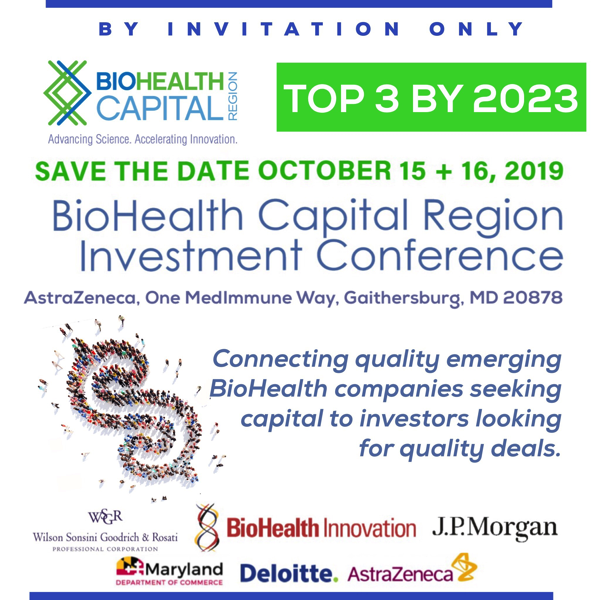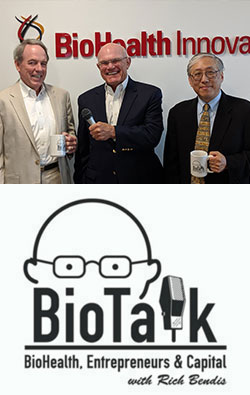

Venture funding for digital health companies reached an all-time high in the first half of 2019, totaling $5.1 billion across 318 deals, according to a recent report.


Venture funding for digital health companies reached an all-time high in the first half of 2019, totaling $5.1 billion across 318 deals, according to a recent report.


QIAGEN N.V. has announced that it has decided to integrate its global sales resources into its Business Areas (Life Sciences, Molecular Diagnostics and Bioinformatics). This transition is expected to allow the Business Areas to oversee the full value chain from innovation to commercialization, which is expected to further increase focus and agility. QIAGEN plans to provide an update during the fourth quarter of 2019.


Spotlights on Inspiring New Collaborative Approaches to Discovery and Development of Treatments and Cures


University of Maryland researchers have discovered that seemingly identical cells can use different protein molecules to carry out the same function in an important cellular process. The scientists named this newly discovered variability “functional mosaicism,” and it has significant implications for the development of therapeutic treatments, which are often designed to target a specific molecule, or a gene that produces a specific molecule.

Immunomic Therapeutics, Inc. (ITI), a privately held, Maryland-based biotechnology company, announced today that it has appointed brain tumor expert E. Antonio ‘Nino’ Chiocca, M.D., Ph.D., Harvey W. Cushing Professor of Neurosurgery, Harvard Medical School Neurosurgeon-in-Chief and Chairman, Department of Neurosurgery, Brigham and Women’s Hospital to its scientific advisory board. ITI is currently applying its investigational UNITE™ platform in immuno-oncology, particularly for virally driven brain cancers, and Dr. Chiocca’s extensive expertise in this field will be instrumental to these efforts.


By invitation only: For questions email BHI@BioHealthInnovation.org
Gaithersburg, MD
|
|
|
|
|
|
|
|
|
|
|
|
|
|
|
|
|
|
|
|
|
|
|
|
|
|
|
|
|
|
|
|
|
|
|
|
|
|
|
|
|
|
|
|
|
|
|
|
|
|
|
|
|
|
|
|
|
|
|
|
|
|
|
|


Are you an experienced biohealth entrepreneur seeking new opportunities in the BioHealth Capital Region? BioHealth Innovation is developing a database of experienced industry personnel willing to work in potential C-suite positions with our university and startup partners. If you would like to have your contact information and vita included in this database for their review and have not done so already, please submit your information to BHI via this form.

 Dr. Zan Fleming, M.D. and Thomas Seoh of Kinexum join Biotalk host Rich Bendis to discuss the company, Metabesity, and their upcoming 2019 Conference in Washington, DC
Dr. Zan Fleming, M.D. and Thomas Seoh of Kinexum join Biotalk host Rich Bendis to discuss the company, Metabesity, and their upcoming 2019 Conference in Washington, DC
Listen now on Google Podcasts http://bit.ly/2kaI8Xt, iTunes https://apple.co/2kc7jsG, and TuneIn http://bit.ly/2lMk79l
Dr. Alexander Fleming is Founder and Executive Chairman of Kinexum, a company with diverse expertise in developing drugs, biotech products, medical devices and digital health technologies. He is also Executive Vice-President of Tolerion, a biotechnology company developing disease-modifying treatments for type 1 diabetes and other autoimmune diseases. Dr. Fleming received his M.D. and internal medicine training from Emory, fellowship training in endocrinology at Vanderbilt and metabolism at National Institutes of Health, where he was a senior fellow.
At the US Food and Drug Administration from 1986-98, Dr. Fleming was responsible for the therapeutic areas of diabetes, other metabolic and endocrine disorders, growth and development, nutrition, lipid-lowering compounds, and reproductive indications. He led reviews of landmark approvals including metformin and the first statin, insulin analog, PPAR-agonist, and growth hormone for non-GH deficiency indications. He conceived and directed the first FDA pilot project to utilize the internet for regulatory communication and represented FDA on the expert working groups for Good Clinical Practices and General Considerations for Clinical Trials of the International Conference on Harmonisation (ICH) and participated on other ICH committees including the Common Technical Document working group.
Dr. Fleming remains active in supporting the development of diabetes-related preventions, treatments, devices, and digital technologies. He serves on the joint technology working groups of the European Association for the Study of Diabetes and American Diabetes Association.
Thomas Seoh is President and CEO of Kinexum, a strategic advisory firm that provides regulatory, clinical, CMC and other translational guidance for life science product development. He is an entrepreneur/executive who has held senior leadership positions in public and private pharmaceutical, biotech and medical device companies for over 25 years.
Mr. Seoh began his career as a corporate attorney in New York and London, then assumed legal management positions with the Consolidated Press group in Livonia, MI, then the ICN Pharmaceuticals group in Costa Mesa, CA. He next became VP, General Counsel and Secretary, and later, SVP Corporate and Commercial Development, of Guilford Pharmaceuticals, a NASDAQ-listed company in Baltimore which commercialized GLIADEL® wafer for glioblastoma multiforme and developed the propofol pro-drug LUSEDRA® and small molecules for Parkinson’s disease. He then became CEO of venture-backed Faust Pharmaceuticals in Strasbourg, France, with a repurposed compound in Phase II for Parkinson’s patients, a re-positioned molecule for Duchenne muscular dystrophy and a GPCR drug discovery platform.
Mr. Seoh subsequently served in leadership positions of medical device startups developing an ex vivo liver dialysis device, a novel mechanical thrombectomy device for Deep Vein Thrombosis and stroke and a state-of-the-art neurocatheter, and a plant-based skin substitute wound dressing. He has served on industry-university advisory boards at Johns Hopkins School of Medicine and the University of Maryland Baltimore County. He holds an AB in Philosophy and History and a JD from Harvard University.
![]()
Congress and the Trump administration are considering proposals to reduce the price of drugs, but there is a strong causal link between current drug prices and revenues on one hand and future drug research and treatments on the other. Policymakers should keep in mind this trade-off between short-term affordability and long-term innovation: Reducing drug revenues today will lead to a decline in future R&D and a decrease in the number of new drug discoveries.